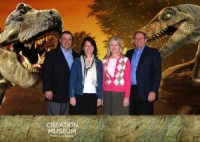Australia is known for its unusual animals. But not only are there animals which are found only in Australia, many animals commonly found elsewhere in the world are not found in Australia. read more …read more Read more here: Creation Moments
Evolutionists tell us that life is an ever-ascending ladder of increasing complexity as new forms of life develop. For proof, they claim that the fossil record shows this kind of development of life. But is this really what the fossil record shows? read more …read more Read more here: Creation Moments
What is warm blooded, sits on its eggs like a hen, but flies much better than a hen, and has six legs? It’s the bumblebee. The amazing fact that bumblebees are warm blooded was discovered after a scientist saw a bumblebee out gathering nectar one frosty cold morning. As it turned out, even with air temperatures near freezing, a bumblebee can maintain a body temperature of 95 degrees (F). read more …read more Read more here: Creation Moments
As bees go about their business of gathering nectar, they also pollinate the flower, making possible the next generation of flowers. Now, there is a certain crafty fungus that doesn’t have flowers, nectar or pollen but makes use of the bees to reproduce itself. read more …read more Read more here: Creation Moments
The theory of evolution did not begin with Charles Darwin. The Greek philosophers who chose not to believe that there is a Creator God tried to explain the origin of everything by time and chance. read more …read more Read more here: Creation Moments
Many species of birds live in communities that are quite complex and even resemble human communities. In the Amazon rainforests of Peru, 20 or more mixed species of birds will flock together in the lower levels of the rainforest canopy. Each flock has a leader and organizer – the bluish-slate ant-shrike. Each morning the ant-shrike will assemble its flock with loud calls. read more …read more Read more here: Creation Moments
Click here to listen. On this episode of ID the Future, Casey Luskin examines how, contrary to the stereotype, it’s actually the supporters of evolution who encourage violations of the First Amendment’s Establishment Clause. This podcast is excerpted from a law review article published in Liberty University Law Review. The article, “Zeal for Darwin’s House Consumes Them: How Supporters of Evolution Encourage Violations of the Establishment Clause,”
Click here to listen. On this episode of ID the Future, hear the concluding episode of I, Charles Darwin, in which Darwin returns to his family home and offers some final reflections on his eye-opening visit to the twenty-first century. Follow the links below to listen to previous chapters of I, Charles Darwin: I, Charles Darwin, Epidode 4: The Secret of the Cell I, Charles Darwin, Epidode 3: Beast to Beast I, Charles Darwin, Episode 2: The Fossils and the Tree I, Charles Darwin, Episode 1: London and the Galapagos
Click here to listen. On this episode of ID the Future, hear another chapter from Nickell John Romjue’s fascinating book I, Charles Darwin. Follow along as Darwin learns about DNA and the other amazing discoveries of molecular biology that have occurred since he developed his theory. Follow the links below to listen to previous chapters of I, Charles Darwin: Episode 5 I, Charles Darwin, Epidode 3: Beast to Beast I, Charles Darwin, Episode 2: The Fossils and the Tree I, Charles Darwin, Episode 1: London and the Galapagos
Click here to listen. This episode of ID the Future features another chapter from Nickell John Romjue’s fascinating book I, Charles Darwin, in which Darwin is shocked to learn about the impact his theory has had on areas outside of science. Episode 1, Episode 2, Episode 4, Episode 5
Click here to listen. Over the next several weeks, ID the Future will be presenting an audio adaptation of Nickell John Romjue’s fascinating book, I, Charles Darwin. In today’s episode, Darwin explores what we’ve learned about the fossil record since his time on Earth–and it’s not what he expects. For more information and to purchase the book, visit www.icharlesdarwin.com. Episode 1, Episode 3, Episode 4, Episode 5
Click here to listen. Over the next several weeks, ID the Future will be presenting an audio adaptation of Nickell John Romjue’s fascinating book, I, Charles Darwin. What would happen if Charles Darwin were to come back today? What would he think about the science of the twenty-first century, and how might it change his views on evolution? In today’s introductory episode, Darwin finds himself returned from the grave and begins to explore modern London, followed by a return trip to the Galapagos Islands, where he is surprised by what he learns. For more information and to purchase the book, [More]
Dr. Troy Shoemaker, the new president of Pensacola Christian College of Florida, and his wife Denise, recently visited our Creation Museum, and it was for the first time. He spoke to our staff while I was wrapping up a speaking engagement in Chicago, but I returned to AiG the next morning to spend some time with the Shoemakers. Several staff—including on the creative side of the museum team and the future Ark Encounter—attended Pensacola Christian College, and Dr. Shoemaker enjoyed getting to meet with many of them. Here is a photo of Dr. Shoemaker and his wife Denise—with museum operations [More]
Click here to listen. On this episode of ID the Future, hear from Casey Luskin as he talks about why science censorship is bad for education, even as Darwin activists such as Zack Kopplin lobby to repress critiques of Darwinian evolution. Casey explains how giving students full access to the best scientific information would help solve many problems facing science education today.
Click here to listen. On this episode of ID the Future, hear the second part of Casey Luskin‘s lecture on intelligent design and law. Luskin explains why Discovery Institute opposes pushing intelligent design into public school curricum and instead wants students to learn more about evolution. Source: 2013/03/science_education_why_we_shoul.html class=”colorbox”>id the future
Click here to listen. On this episode of ID the Future, listen to the first segment of a recent talk that Casey Luskin gave on ID and law where he unpacks the definition of intelligent design. As Casey points out, intelligent design involves much more than just a critique of Darwinian evolution; it uses reasoning to recognize patterns that show an intelligent origin, similar to methods employed in archaeology and forensic science.
On this episode of ID the Future, Anika Smith interviews CSC fellow Nancy Pearcey, who discusses her recent book, Saving Leonardo: A Call to Resist the Secular Assault on Mind, Morals, and Meaning. Listen in as Mrs. Pearcey explains how naturalism filtered down to the public imagination from Darwin to art, literature, and film. Check out a review of the book at Evolution News & Views. …read more
On this episode of ID the Future, David Klinghoffer talks about what it means to be a “Friend of Darwin.” In the case of Zack Kopplin, a 2012 recipient of the Friend of Darwin award, it means grossly misleading the public about science and education by equating skepticism of Darwinian evolution with biblical creationism. …read more
On this episode of ID the Future, Dr. Frank Tipler discusses how leading science journals are increasingly hostile to new ideas, publishing only papers that are consistent with the dominant views of the scientific community. Tipler argues that if Einstein were to try to get a paper on his relativity theory published under today’s peer-review system, he would certainly be rejected, and reminds us that in order to cultivate great scientists, academia needs to encourage them to challenge conformity. …read more
I recently learned that the Verbum Domini Bible manuscript exhibit inside our Creation Museum—which is a part of the Green Collection that will be on display in Washington DC in the future Museum of the Bible—will be featured tonight in a segment on the nationally syndicated program The List. The show’s website describes the program as “a television news magazine that finds the intersection between the news of the day and pop culture … founded around something we all use to stay on track – lists – to look at daily consumer issues and the hottest news trends.” This [More]
On this episode of ID the Future, Casey Luskin continues his interview with Biologic Institute director Douglas Axe about his new paper, “The Limit of Complex Adaptation: An Analysis Based on a Simple Model of Structured Bacterial Populations,” in BIO-Complexity. Listen in as Dr. Axe reports on the work done at Biologic Institute to test whether amino acids are able to be converted from one function to another in Darwinian step-wise fashion. …read more
On this episode of ID the Future, Casey Luskin interviews Biologic Insitute director Douglas Axe about his peer-reviewed paper in BIO-Complexity, “The Limit of Complex Adaptation: An Analysis Based on a Simple Model of Structured Bacterial Populations.” Dr. Axe explains complex adaptations — adaptive changes that require more than one simple mutation to a genome in order for a particular adaptation to work — and the difficulty Darwinian evolution faces when beneficial mutations have maladaptive intermediate stages. …read more
Listen Now On this episode of ID The Future, Jay Richards talks with Professor and author John Lennox about one of his latest books, Seven Days that Divide the World: The Beginning According to Genesis and Science. In his book, Lennox delves into controversial issues surrounding science and faith, answering common questions regarding apparent tensions between scripture and scientific evidence. Tune in as Professor Lennox demonstrates that science and faith are indeed compatible.
Listen Now Part 1 Part 3 On this episode of ID the Future, Casey Luskin once again sits down with Dr. Frank Tipler, Professor of Mathematics and Physics at Tulane University and author of The Anthropic Cosmological Principle. Casey and Dr. Tipler continue their discussion on fine tuning in the universe, the multiverse, and the evidence for cosmic design.
Listen Now. Part 2 Part 3 On this episode of ID the Future, hear from Frank Tipler, Professor of Mathematics and Physics at Tulane University and author of The Anthropic Cosmological Principle. Dr. Tipler compares the perspectives of Einstein and Darwin and explains how the difference in their views applies to the debate over origins, Darwinian evolution, and intelligent design.
Listen Now On this episode of ID the Future, Casey Luskin interviews Cecil Phillips, who tells the story of how he was expelled from Americans United for Separation of Church and State because he was a scientific skeptic of Darwinian evolution. Listen in as they discuss how the Darwin lobby seeks to marginalize Darwin skeptics by branding them with inaccurate labels and shutting down free speech.
Listen Now Part 1 Part 2 On this episode of ID the Future, Casey Luskin and Dr. Frank Tipler continue their discussion of fine-tuning, the multiverse, and the cosmological evidence for design. Dr. Tipler argues that the initial conditions of the universe must have been “fine-tuned,” explaining that our universe was at its minimum entropy at its beginning. The probability of this condition occurring randomly is 1 in 1010^123 -staggeringly unlikely. Could the universe be “self-creating,” as Stephen Hawking has argued? Listen in as Tipler says the answer is “No.”









































